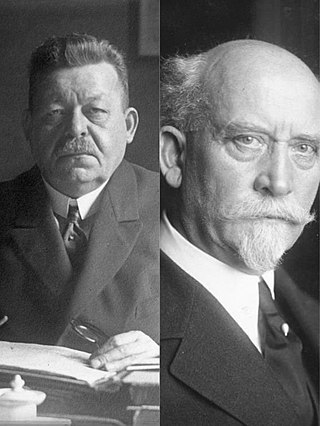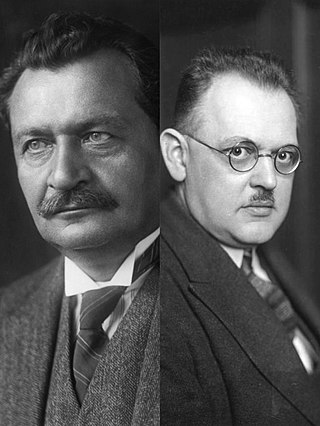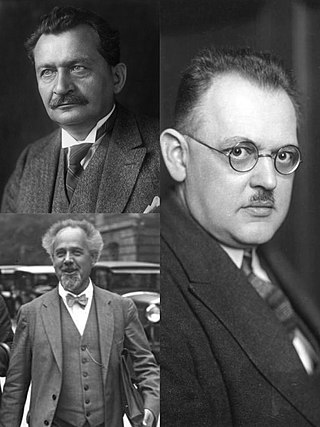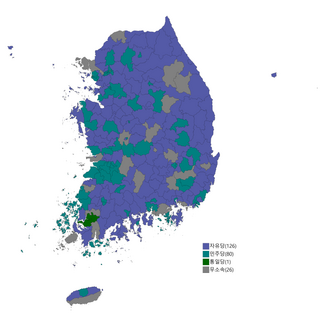 |
|---|
General elections were held in Honduras in October 1902. [1] Manuel Bonilla of La Democracia won the presidential election with 48.7% of the vote. [2]
 |
|---|
General elections were held in Honduras in October 1902. [1] Manuel Bonilla of La Democracia won the presidential election with 48.7% of the vote. [2]
The official results had a total of 58,589 valid votes, 50 more than the total of votes for each candidate.
| Candidate | Party | Votes | % | |
|---|---|---|---|---|
| Manuel Bonilla | La Democracia | 28,550 | 48.77 | |
| Juan Ángel Arias Boquín | Liberal Party | 25,118 | 42.91 | |
| Marco Aurelio Soto | Patriotic Union Club | 4,857 | 8.30 | |
| Other candidates | 14 | 0.02 | ||
| Total | 58,539 | 100.00 | ||
| Valid votes | 58,539 | 99.89 | ||
| Invalid/blank votes | 64 | 0.11 | ||
| Total votes | 58,603 | 100.00 | ||
| Source: Nohlen | ||||
| Candidate | Party | Votes | % | |
|---|---|---|---|---|
| Miguel R. Dávila | La Democracia | 28,548 | 48.77 | |
| Máximo Betancourt Rosales | Liberal Party | 25,117 | 42.91 | |
| Rafael Alvarado Manzano | Patriotic Union Club | 4,855 | 8.29 | |
| Other candidates | 19 | 0.03 | ||
| Total | 58,539 | 100.00 | ||
| Valid votes | 58,539 | 99.89 | ||
| Invalid/blank votes | 64 | 0.11 | ||
| Total votes | 58,603 | 100.00 | ||
| Source: Lara [3] | ||||

Federal elections were held in Germany on 19 January 1919, although members of the standing army in the east did not vote until 2 February. The elections were the first of the new Weimar Republic, which had been established after World War I and the Revolution of 1918–19, and the first with women's suffrage. The previous constituencies, which heavily overrepresented rural areas, were scrapped, and the elections held using a form of proportional representation. The voting age was also lowered from 25 to 20. Austrian citizens living in Germany were allowed to vote, with German citizens living in Austria being allowed to vote in the February 1919 Constitutional Assembly elections.

Federal elections were held in Germany on 6 June 1920. Territorial disputes meant that voting was delayed in East Prussia and Schleswig-Holstein until 20 February 1921, and until 19 November 1922 in Oppeln. The Social Democratic Party remained the largest party in the Reichstag although it lost over a third of its seats. Voter turnout was about 79.2%.

Federal elections were held in Germany on 4 May 1924, after the Reichstag had been dissolved on 13 March. The Social Democratic Party remained the largest party, winning 100 of the 472 seats. Voter turnout was 77.4%.

General elections were held in Venezuela on 5 December 1993. The presidential elections were won by Rafael Caldera of National Convergence, who received 30.5% of the vote. Democratic Action remained the largest party in the Chamber of Deputies and Senate, which were elected on separate ballots for the first time. Voter turnout was 60.2%, the lowest since World War II.

General elections were held in Bolivia on 9 July 1978. The elections were the first held since 1966, with several military coups taking place during the late 1960s and early 1970s. Although Juan Pereda of the Nationalist Union of the People won the presidential elections according to official statements, more votes were cast than there were registered voters. After examining a number of allegations of fraud and other irregularities, the Electoral Court decided to annul the results on 20 July. The following day, Pereda was installed as President following a military coup. Pereda himself was overthrown by yet another military coup in November, which saw General David Padilla assume the presidency. Fresh elections were held the following year, with Padilla transferring power to his democratically elected successor, Wálter Guevara.

Legislative elections were held in South Korea on Friday 2 May 1958. The result was a victory for the Liberal Party, which won 126 of the 233 seats. Voter turnout was 87.8%.

Full general elections were held in Belgium on 14 October 1894, with run-off elections held on 21 October 1894.

Constitutional Assembly elections were held in Latvia on 17 and 18 April 1920. The Latvian Social Democratic Workers' Party emerged as the largest party in the Constitutional Assembly, winning 57 of the 150 seats. The elections were boycotted by communist parties. The Constitutional Assembly was responsible for drafting a constitution, which was approved on 15 February and promulgated on 7 November 1922.
Parliamentary elections were held in Hungary between 8 and 15 December 1926. The result was a victory for the Unity Party, which won 161 of the 245 seats in Parliament. István Bethlen remained Prime Minister.
Parliamentary elections were held in Hungary between 28 and 30 June 1931. The result was a victory for the Unity Party, which won 149 of the 245 seats in Parliament. István Bethlen remained Prime Minister, but resigned on 24 August due to the effects of the Great Depression and was replaced by Gyula Károlyi.
Parliamentary elections were held in Hungary between 31 March and 7 April 1935. The result was a victory for the Party of National Unity, which won 164 of the 245 seats in Parliament. Gyula Gömbös remained Prime Minister.
Parliamentary elections were held in Hungary on 28 and 29 May 1939. The result was a victory for the Party of Hungarian Life, which won 181 of the 260 seats in Parliament and won 49 percent of the popular vote in the election. Pál Teleki remained Prime Minister. This was a major breakthrough for the far-right in Hungary; between them, far-right parties were officially credited with 49 seats and 25 percent of the vote.
General elections were held in Italy on 27 January 1861, with a second round on 3 February. The newly elected Parliament first convened in Turin on 4 March 1861, where, thirteen days later, it declared the unification of the country as the Kingdom of Italy.
General elections were held in Italy on 22 October 1865, with a second round of voting on 29 October. It was the second one in the history of Italy.
General elections were held in Italy on 8 November, with a second round of voting on 15 November. They were a snap election, called by Prime Minister Marco Minghetti to strengthen his majority.

General elections were held in Italy on 5 November, with a second round of voting on 12 November.

General elections were held in Italy on 16 May 1880, with a second round of voting on 23 May.

Parliamentary elections were held in Latvia on 7 and 8 October 1922. The Latvian Social Democratic Workers' Party remained the largest party, winning 30 of the 100 seats.

Parliamentary elections were held in Latvia on 3 and 4 October 1925. The Latvian Social Democratic Workers' Party remained the largest party, winning 32 of the 100 seats.

Parliamentary elections were held in Portugal on 3 November 1957. The ruling National Union won all 120 seats.